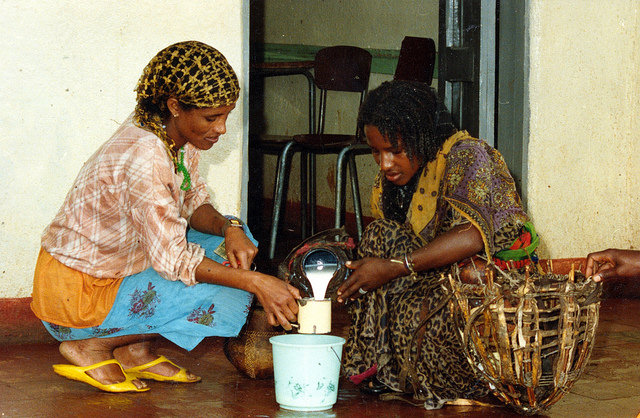The following is an excerpted version of a blog story originally published on the CGIARResearch Program on Agriculture for Nutrition and Health (A4NH) website. The story relates closely to this year’s theme for World Health Day, which highlights the importance of food safety across the global food system.
Some of the foods that would most enhance nutrition in diets in the developing world are also the riskiest in terms of food safety. Numerous health risks exist along the value chain for livestock and fish products, from production to consumption. In this post, Sophie Theis (Research Analyst, Poverty, Health, Nutrition Division, International Food Policy Research Institute) and Delia Grace (Program Manager, International Livestock Research Institute) relate findings from a recent A4NH/International Livestock Research Institute analysis of 20 livestock and fish value chains in Africa and Asia that reveal how gender differences in value chain participation influence risk exposure.
The results from the participatory risk assessment of these value chains are published inGrace et al (2010), and a paper analyzing the gendered dimensions of risk is underway by Delia Grace, Sophie Theis, Kristina Roesel, Erastus Kang’ethe, and Bassirou Bonfoh.
In rural Mali, a Fulani herder finishes milking a cow and hoists the calabash to his head, the milk sloshing gently in the vessel as he carefully carries the milk to Mariam, the woman he works for. By custom, Mariam has never milked a cow, but once the milk is in her domain, she is in charge of its business and use. Today she decides to keep this calabash for the family, since she has been able to sell milk at a favorable price often in the past week. She sets most aside to naturally sour, which will preserve it in the absence of refrigeration; the fermentation gives a sharp taste that consumers find thirst quenching in the hot season.
In the outskirts of Nairobi, Faith works the udders of her dairy cow. A male relative she has hired to help with the milking approaches with another pail of milk. She accepts it absentmindedly; she is already estimating the prices she will get selling the milk to neighbors and the local milk bar and considering whether she should invest the revenues in hiring another person.
In rural Mali, periurban Kenya, and many other parts of Africa, women play important and varied roles in livestock and fish value chains. The milk that Mariam and Faith helped to produce goes both to their families and to the market; it is also valued as gifts and in Mali as a sacrifice that brings blessing and protection against evil.
The decisions that Mariam and Faith make have bearings on many people’s nutrition: the quantity of milk that they keep for their household, how they apportion milk amongst household members, the use of the income from milk that they sell, and – less often acknowledged, but critical – the extent to which they effectively manage food safety risk, preventing contamination of the milk.
Many of the most nutritious foods, including animal source foods, are amongst the riskiest in terms of pathogen transmission. Meat, milk, fish and eggs provide plenty of nutrients for pathogenic organisms and can also carry infections from animals that harbor them to people. Food-borne disease persists as a major public health problem in Africa and Asia, where the majority of these foods are produced by smallholders, marketed through the informal sector, and sold in wet markets.
Food safety in these products is a major concern, as informal markets are important sources of food for the poor and tend to provide food that is more accessible, affordable, and compatible with local preferences for certain varieties of food and quantities than supermarkets.
Women like Mariam and Faith manage risk as they interact with informal markets by selling and buying food for their households. Informal value chains are complex, shaped by a number of actors. While risk management training interventions tend to focus on the owners of livestock or on actors only in one node of the value chain (e.g. butchers), risk management relies on all the actors along the value chain, from production, aggregation, processing, retail, and consumption. Many of these actors are women, and attention to local norms in the division of labor is critical for targeting food safety assessments and interventions.







